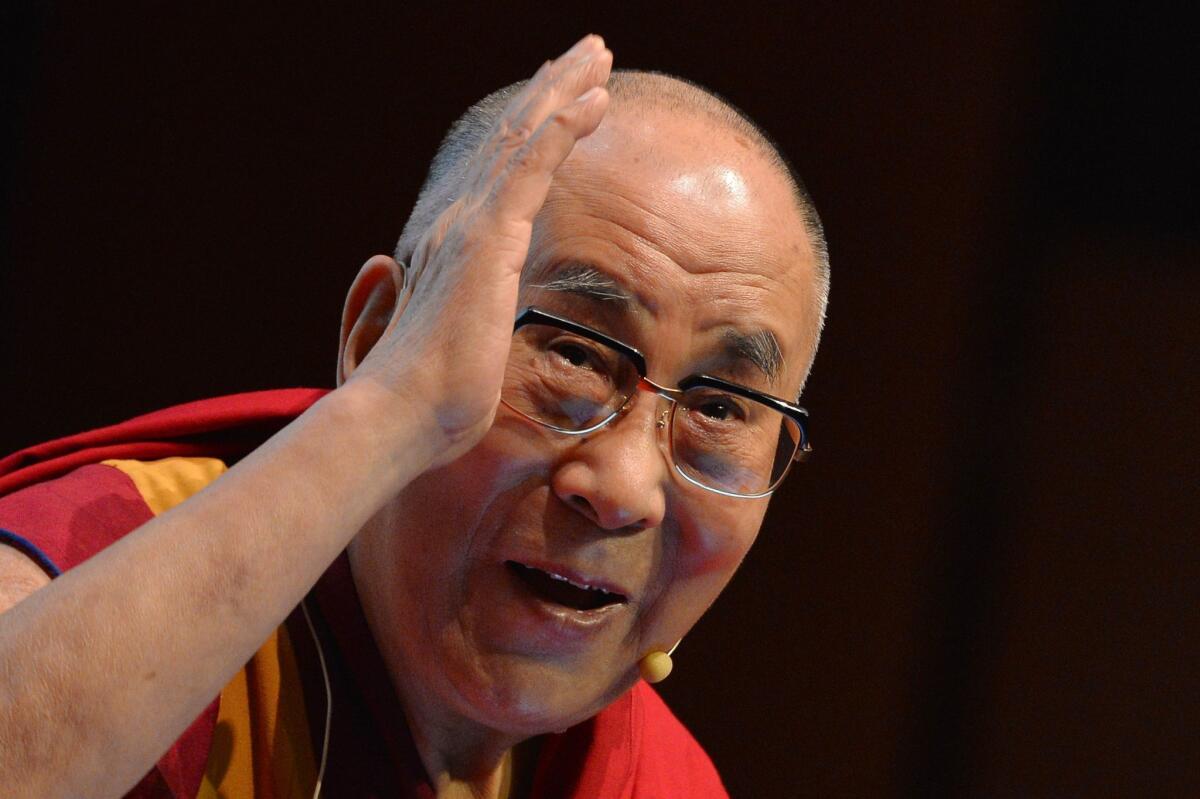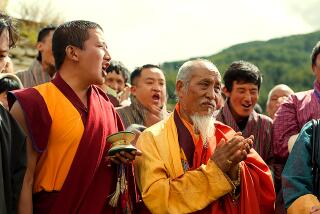Why the Dalai Lama says reincarnation might not be for him

Adherents of Tibetan Buddhism believe the Dalai Lama, the religion’s highest spiritual authority, has been reincarnated in an unbroken line for centuries. But the current Dalai Lama says he may be the last.
In an interview with the BBC this week, the 79-year-old Nobel Peace Prize recipient said that he may not reincarnate after he dies.
“There is no guarantee that some stupid Dalai Lama won’t come next, who will disgrace himself or herself,” he said. “That would be very sad. So, much better that a centuries-old tradition should cease at the time of a quite popular Dalai Lama.”
But what does reincarnation mean, and why would the Dalai Lama not want to have a successor?
How do Tibetan Buddhists believe reincarnation works?
Tibetan Buddhism teaches that after death, nearly all of us are flung back into the world of the living under the influence of harmful impulses and desires. But through compassion and prayer, a few can choose the time, place and the parents to whom they return. This affirms Buddhist teachings that one’s spirit can return to benefit humanity; it also serves to maintain a strong theological and political structure based around monasticism and celibacy.
The process through which reincarnated Buddhist masters, known as “tulkus,” are discovered is not uniform among the four main schools of Tibetan Buddhism. But generally, through dreams, signals, and other clues, senior monks identify candidates from a pool of boys born around the time the previous incarnation died. The current Dalai Lama is the 14th in the line of the Gelug school. The son of a farmer, he was recognized in 1950 after he correctly picked out objects owned by his predecessor, such as a bowl and prayer beads, jumbled among unfamiliar items.
So why would the Dalai Lama refuse to reincarnate?
Almost certainly to prevent the Chinese government from inserting itself into the process for political ends. Tibet was incorporated into China more than 60 years ago; the Dalai Lama went into exile in India in 1959 amid a revolt. China’s government has denounced him as a separatist, but the Dalai Lama currently says he only seeks a high degree of autonomy for Tibet.
In the mid-1990s, the Dalai Lama identified a 6-year-old boy as the Panchen Lama, a position second only to the Dalai Lama himself. But Chinese authorities took custody of the child, and his whereabouts remain unclear. Meanwhile, Chinese authorities identified another youth as the Panchen Lama, but he never won the trust of Tibetans.
In 2011, the Dalai Lama wrote: “Should the concerned public express a strong wish for the Dalai Lamas to continue, there is an obvious risk of vested political interests misusing the reincarnation system to fulfill their own political agenda.” He said then that he would reevaluate whether the custom should go on when he was in his 90s.
Why the statement now?
In fact, the Dalai Lama has claimed that as early as 1969 he made clear that the Tibetan people should decide whether reincarnations should continue. He has previously stated that he would not reincarnate in Tibet if it were not free, and he has mused that the Tibetan people should select their religious leaders democratically. To that effect, he has already divested the political power of his role to an elected official, based in India.
In September, the Dalai Lama stepped up his rhetoric on this point, raising the suggestion that he might be the last of his line. “If a weak Dalai Lama comes along, it will just disgrace the Dalai Lama,” he told the German newspaper Welt am Sonntag.
What do Chinese authorities say?
After the Dalai Lama’s statement in September, the Chinese government issued a firm rebuttal. Foreign Ministry spokeswoman Hua Chunying told reporters, “The title of Dalai Lama is conferred by the central government.” China, which is officially atheist, will follow “set religious procedure and historic custom” to select a successor, she said.
Other officials have followed suit. “Only the central government can decide on keeping, or getting rid of, the Dalai Lama’s lineage, and the 14th Dalai Lama does not have the final say,” Zhu Weiqun, chairman of the ethnic and religious affairs committee of a high-ranking advisory body to China’s parliament, told the state-run Global Times newspaper this week. “All [the Dalai Lama] can do is use his religious title to write about the continuation or not of the Dalai Lama to get eyeballs overseas.”
What happens next?
It’s unclear what will happen when the Dalai Lama dies, but the decision is a sensitive one that will put pressure on the Chinese government.
If the Chinese government does select a successor, its choice could be rejected by Tibetans, and that could exacerbate strained relations.
But the Dalai Lama has made nonviolence a key tenet of his teachings, and losing him – and any reincarnation – could also be risky.
Wu Chuke, a professor of social science at Beijing’s Ethnic Studies University, said that if the position is left empty, “many of the Tibetan Buddhists in China will feel like that the not being able to be reincarnated will be due to restrictions from the government and will further damage the relationship between them. This will put new pressure on the Chinese government in how they will deal with this problem.”
Silbert is a special correspondent.
More to Read
Start your day right
Sign up for Essential California for news, features and recommendations from the L.A. Times and beyond in your inbox six days a week.
You may occasionally receive promotional content from the Los Angeles Times.






